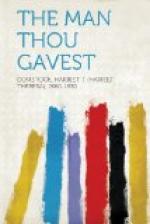“No, little girl. It comes that way in real life when hearts are big enough and strong enough to bear it.” Truedale watched the effect of his words upon the strange, young face before him. They forced their way through her ignorance and untrained yearning for love and admiration. It was a perilous moment, for conscience, on Truedale’s part, seemed drugged and sleeping and Nella-Rose was awakening to that which she had never known before. Gone, for her, were caprice and mischief; she seemed about to see and hear some wonderful thing that eluded but called her on.
And after that first day they met often. “Happened upon each other” was the way Truedale put it. It seemed very natural. The picturesque spots appealed to them both. There was reading, too—carefully selected bits. It was intensely interesting to lead the untrained mind into bewildering mazes—to watch surprise, wonder, and perplexity merge into understanding and enjoyment. Truedale experienced the satisfaction of seeing that, for the first time in his life, he was a great power. The thought set his brain whirling a bit, but it made him seriously humble as well.
Gradually his doubts and introspections became more definite; he lived day by day, hour by hour; while Jim White tarried, Nella-Rose remained; and the past—Truedale’s past—faded almost from sight. He could hardly realize, when thinking of it afterward, where and how he decided to cut loose from his past, and all it meant, and accept a future almost ludicrously different from anything he had contemplated.
One day a reference to Burke Lawson was made and, instead of letting it pass as heretofore, he asked suddenly of Nella-Rose:
“What is he to you?”
The girl flushed and turned away.
“Burke?—oh, Burke isn’t—anything—now!”
“Was he ever—anything?”
“I reckon he wasn’t; I know he wasn’t!”
Then, like a flash, Truedale believed he understood what had happened. This simple girl meant more to him than anything else—more than the past and what it held! A baser man would not have been greatly disturbed by this knowledge; a man with more experience and background would have understood it and known that it was a phase that must be dealt with sternly and uncompromisingly, but that it was merely a phase and as such bound to pass. Not so Truedale. He was stirred to the roots of his being; every experience was to him a concrete fact and, consequently, momentous. In order to keep pure the emotions that overpowered him at times, he must renounce all that separated him from Nella-Rose and reconstruct his life; or—he must let her go!
Once Truedale began to reason this out, once he saw Nella-Rose’s dependence upon him—her trust and happiness—he capitulated and permitted his imagination to picture and colour the time on ahead. He refused to turn a backward glance.
Of course all this was not achieved without struggle and foreboding; but he saw no way to hold what once was dear, without dishonour to that which now was dearer; and he—let go!




